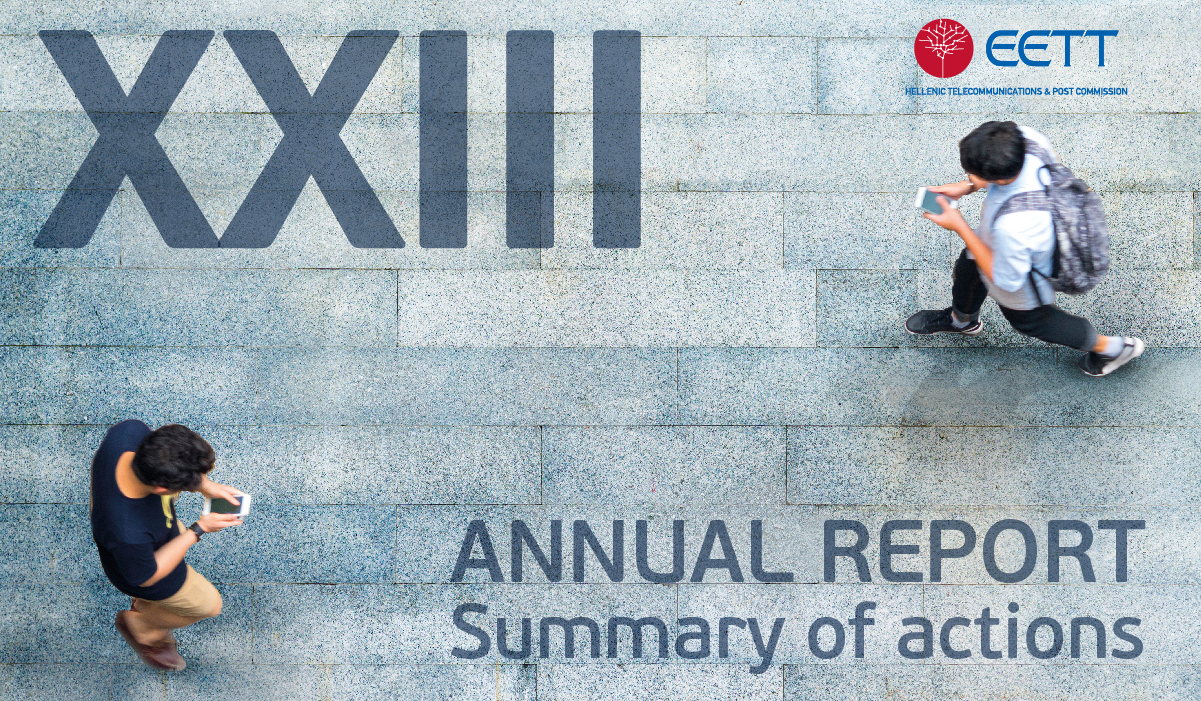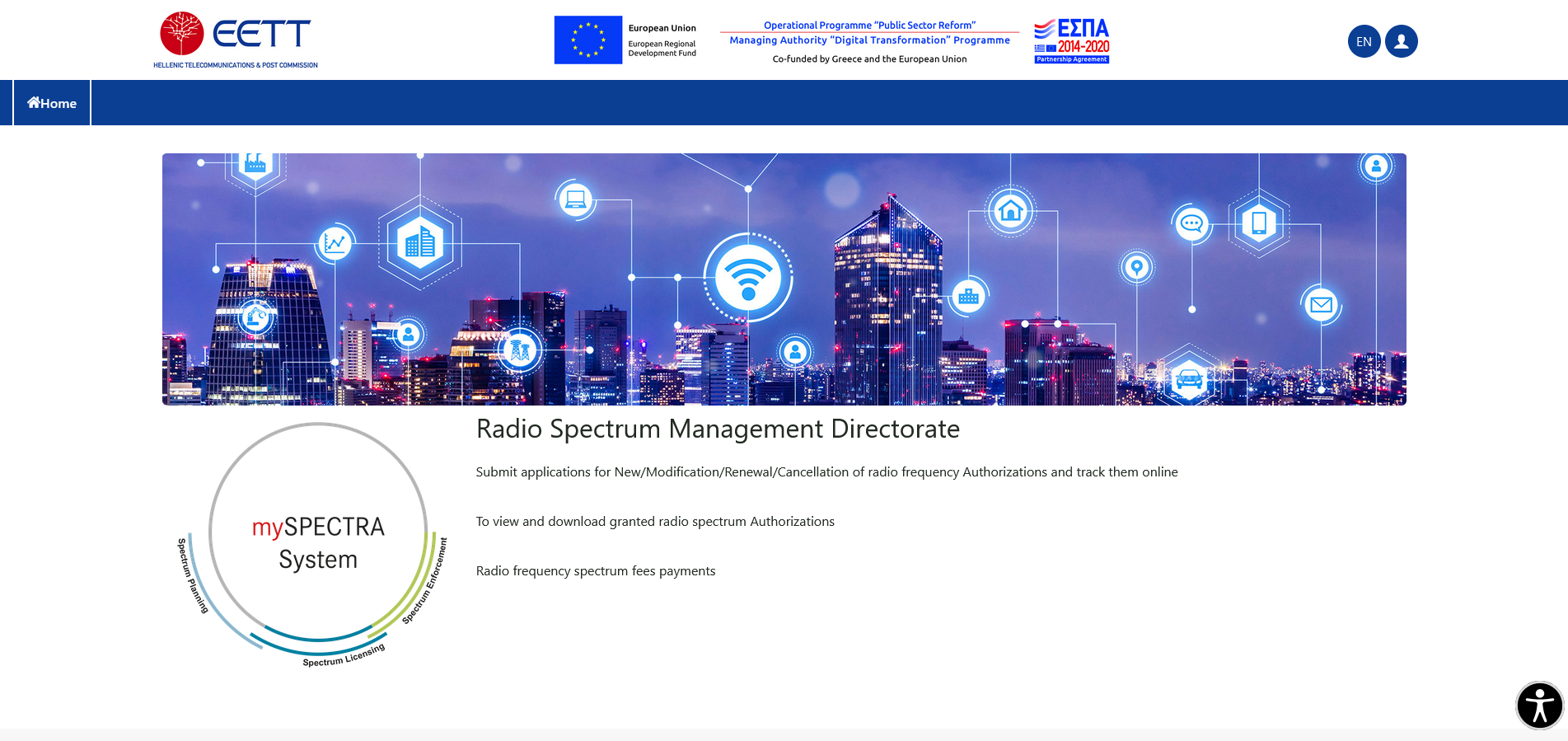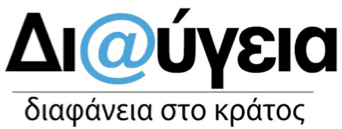ΕΕΤΤ supervises and monitors the use of radio spectrum:
Α) It monitors the use of radio frequency spectrum, aiming at recording its status at any given time, with a view to ensuring its more efficient and proper management, and also provides important information about the following:
- Dynamic performance and use of radio spectrum.
- Granting of new rights of use for radio frequencies.
- Developing new more efficient spectrum management models.
- Understanding propagation and interference.
Through monitoring the use of radio spectrum:
- The functionality of the theoretical planning for frequency allocation is ensured.
- Interferences are identified and promptly terminated at local, regional and international level.
- An up-to-date database and record of the use of radio frequencies is created.
- The adequate quality of signal reception (television and radio broadcasting) is inspected and ensured.
- Useful data is generated for studying the introduction of new services and spectrum uses at International Telecommunication Union (ITU) level.
- The implementation of the legislative-regulatory framework and the rights of use for radio frequencies is enforced.
- Competent state authorities are facilitated in their planning of policies and undertaking initiatives in sectors of national economy, including electronic communications and content/news/entertainment, which directly and/or indirectly benefit consumers.
B) EETT conducts inspections, either on its own initiative or upon receipt of complaints, on a daily basis. Inspections are conducted upon planning, prioritized based on the criticality of the problems arising from the occurrence of interferences.
In the framework of its inspections, EETT investigates the legal use of the spectrum and the legality of antenna constructions.
Inspections of the legal use of radio spectrum
The main categories of services, on which inspections focus, are as follows:
Fixed service
The legality of use and the creation of interference in licensed services (e.g. radio-electric links), as well as the legality of fixed service systems (e.g. WiFi networks) are the focus of inspection.
Mobile service
- Mobile phone networks
Interference in the reception frequencies of a base station with which the mobile phones of users communicate. Interferences to the frequencies of mobile base stations are likely to arise from:
- DECT 6.0 fixed-line cordless devices and/or wireless devices not bearing the CE marking.
- Spurious emissions from DECT cordless devices, home TV signal amplifier systems, radio station broadcasting systems and electrical power devices.
- Repeater systems of mobile phone signals.
- Home wireless image transmission systems (video sender).
- Special radio networks
Interferences to special radio networks are inspected. A great number of interferences involves telecommand systems and home electronics. The most frequent emerging problems are associated with the operation of short-range telecommand systems, a device that is transmitting constantly and/or operates based on different technical specifications due to design or fault.
Satellite services
Inspections are conducted regarding interferences to the radio spectrum used by satellite services, such as interferences to Global Satellite Positioning System (GPS) receivers.
Terrestrial digital television broadcasting services
The compliance of terrestrial digital television broadcasting network providers with the technical specifications for broadcasting television signal, as defined in the Terrestrial Digital Television Broadcasting Frequency Plan (especially in terms of the channels and defined broadcasting centers), as well as the legality of the installation and operation of their antenna systems. In addition, as far as the private network provider is concerned, EETT audits its compliance with the availability limits, as determined within the scope of the granted right of use for radio frequencies for terrestrial digital broadcasting.
Radio broadcasting
Inspections are carried out regarding:
- The legal operation of radio stations from the Greek capital and secondary broadcasting centers, based on the data provided by the National Council for Radio and Television (NCRTV), as well as the installation and operation of their antenna systems.
- Any interferences to legal transmissions (e.g. during the operation of the network of the Hellenic Civil Aviation Authority (CAA) and/or other legally operating networks, as well as upon occurrence of mutual interference).
- Non-compliance with the obligation of radio stations to broadcast using the frequencies as provided for by applicable provisions and the primary broadcasting center, as stated in the relevant tables prepared by NCRTV.
- Non-compliance with conditions relating to the use of secondary broadcasting centers.
The results of inspections are assessed based on the decisions on the legal operation and technical specifications provided by NCRTV, data from the Ministry of Digital Governance and the legislative framework.
State networks
Complaints about state networks are promptly investigated on a 24-hour basis. The uninterrupted operation of wireless networks which relate to the protection of human life as well as public and national security constitutes a high priority for EETT. The majority of problems are detected in the network of the Hellenic Civil Aviation Authority (CAA), since the spectrum allocated to networks of air navigation (108-137MHz) is contiguous with the radio broadcast band (87.5-108MHz).
Radio amateurs
Interference to radio stations of radio amateurs and the legality of radio amateur antenna systems, where license is required, but also potential cause of interference during their use are investigated.
Inspections of antenna constructions
On-site inspections are conducted, either upon complaints or ex officio, as well as new compliance inspections regarding mobile antenna constructions. In addition, inspections are conducted for all kinds of antenna systems (e.g. antenna systems relating to WiFi, radio stations and terrestrial digital television broadcasting, radio links).
Where, upon inspection, an infringement is found, penalties will be imposed. If interferences are located outside Greece, findings are forwarded to the Ministry of Digital Governance, which is responsible for international coordination.
In addition, EETT carries out measurements regarding the quality of mobile communications services, using the appropriate measuring equipment.






